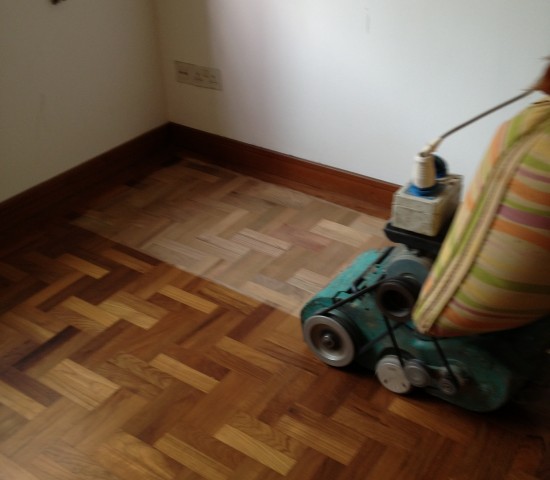Managing Flooring & Table-top Maintenance Chores
(1) Should tenant be held responsible for the scratches on the parquet flooring?
Owners will always get upset to see scratches on the parquet flooring when inspecting their investment properties during Handover Session (Tenant-to-Owner). This is especially so when tenants are treating it as “wear & tear” and is part and parcel of usage.
In order not to have disputes over the scratches, both owners and tenants should take photographs of all these “defects” of the tenanted unit during the Handover Session (Owner-to-Tenant) or before the commencement of the leases. Photos should be printed in 2 sets, clearly stating the location (eg “Master Bedroom”, “Bedroom 2” or “Bedroom 3”, “Dining room” etc), as well as stating the condition of the “defects” (eg, scratches on parquet flooring; torn night curtains etc” and signed off by both owners and tenants. This is an important exercise because most leases are for a long term (1,2 or 3 years) and on expiry of the leases, owners/tenants or even Sales Persons (agents) may no longer remember.
Owners will always get upset to see scratches on the parquet flooring when inspecting their investment properties during Handover Session (Tenant-to-Owner). This is especially so when tenants are treating it as “wear & tear” and is part and parcel of usage.
In order not to have disputes over the scratches, both owners and tenants should take photographs of all these “defects” of the tenanted unit during the Handover Session (Owner-to-Tenant) or before the commencement of the leases. Photos should be printed in 2 sets, clearly stating the location (eg “Master Bedroom”, “Bedroom 2” or “Bedroom 3”, “Dining room” etc), as well as stating the condition of the “defects” (eg, scratches on parquet flooring; torn night curtains etc” and signed off by both owners and tenants. This is an important exercise because most leases are for a long term (1,2 or 3 years) and on expiry of the leases, owners/tenants or even Sales Persons (agents) may no longer remember.

Furthermore, if this unit is sold, the owners may change; if there is a break lease case by tenants, tenants may change; even Sales Persons (agents) may change. By taking photographs of such “Defects”, it will reduce the misunderstanding between owners and tenants on expiry of the leases.
One thing quite interesting, shared by our associate ResidentAgent®s, worth mentioning over here. Most tenants do not want to put in as part of the leasing request in the Letter of Intent (LOI) to ask owner to varnish the parquet flooring before the commencement of their leases. This is even though there are many small scratches on the parquet flooring in the bedrooms. Why? This is because after varnishing, tenants living in the unit would be pressurized to keep the parquet flooring intact because if and when it is being scratched, it would be very obvious. Tenants would then be asked to pay and rectify the parquet flooring come expiry of the leases. Hence, most tenants simply leave it “as it is” condition and not requiring the owner to varnish the parquet flooring. This will work out perfect for the owner for obvious reasons – don’t need to spend money on varnishing of parquet flooring before tenants move into his/her investment properties. This will be a win-win situation for the owners and the tenants.
Back to the question of whether tenant should be held responsible for the scratches on the parquet flooring.
If owners insist and tenants were to have no choice but to pay for the damage, the amount of damage would depend on the amount of scratches or the extent of the damage done to the parquet flooring. However, it would be hard to find parquet flooring contractors willing to come by to varnish and rectify the small area of the affected parquet flooring. Minimum for parquet flooring contractors to take up the job is to varnish the entire bedroom to make their single trip worthwhile. This would mean owners have to charge the entire cost of parquet flooring varnishing for the whole room to the tenant which would be unfair. End of the day, even if tenant were to agree to a percentage of cost sharing, there will always be some unhappiness after the Handover Session (Tenant-to-Owner). Of course, ultimate decision whether to deduct a % off from the Security Deposit lies entirely with the owners and to be agreed by tenants.
If you need further clarification of the above issue, please contact us to find out more.
… continue reading 9 other Home Maintenance topics.

 Regn No.: 53333974W
Regn No.: 53333974W